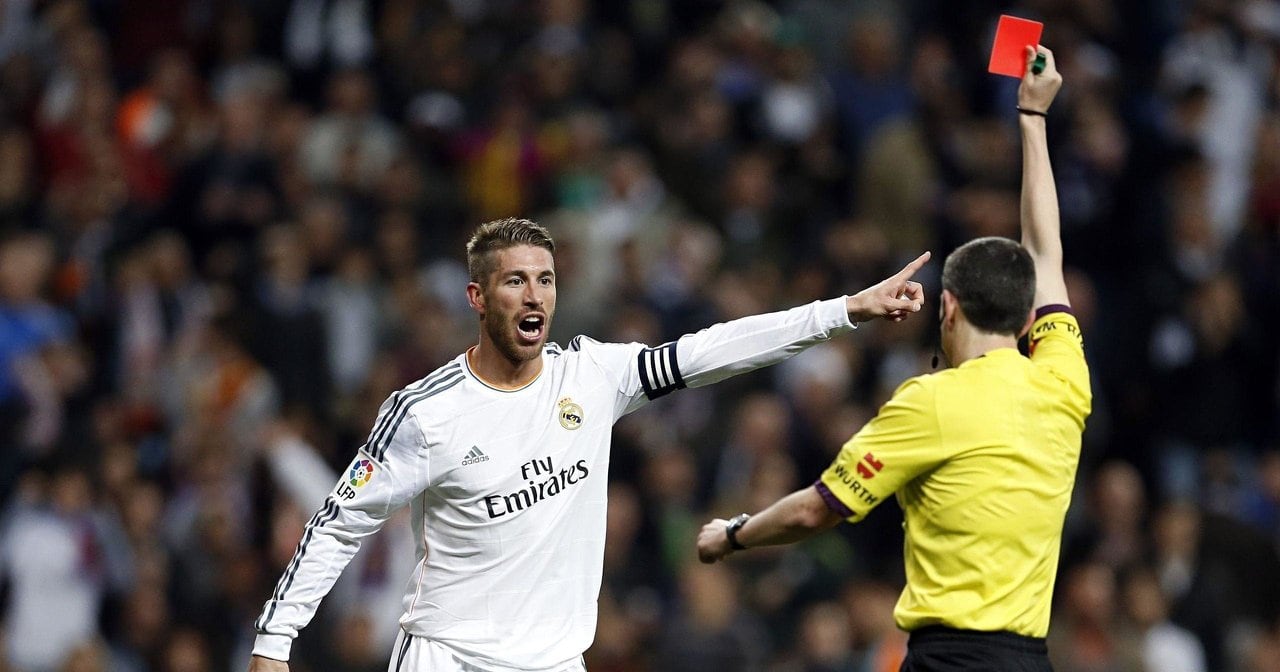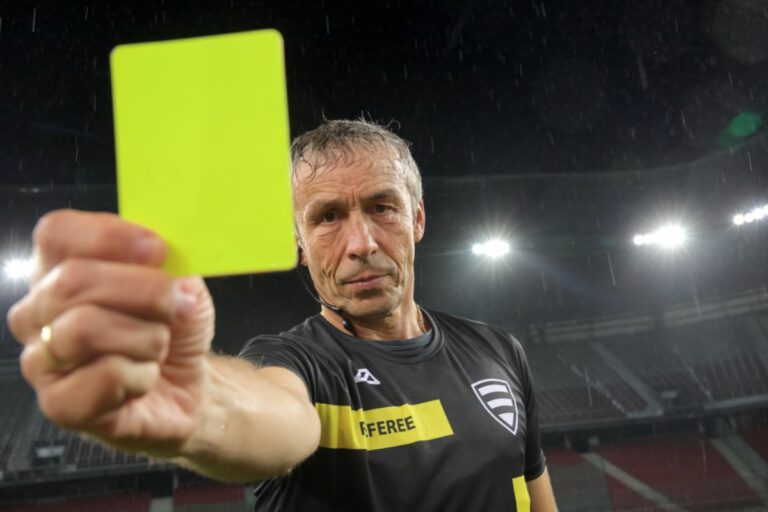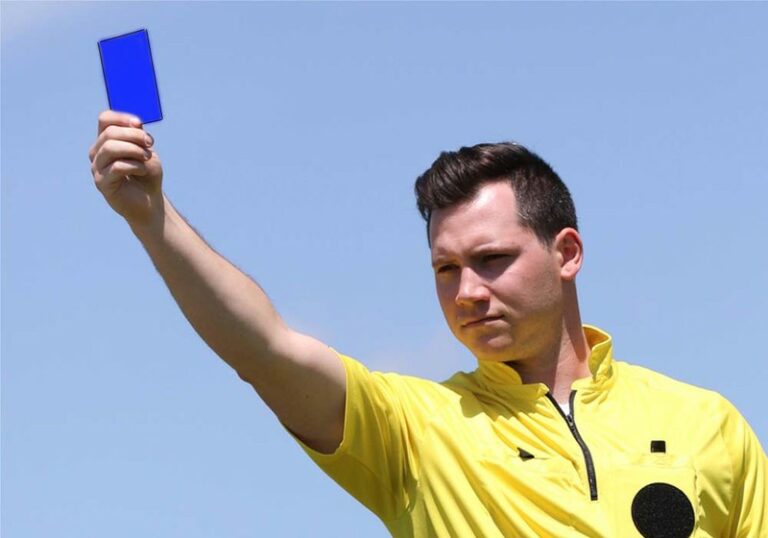The red card in soccer is one of the most important parts of the game and can be used as a disciplinary tool when players commit serious fouls or misconduct. In this guide, we will take a look at what constitutes a red-card offense, how referees use it, and some of its implications for teams.
We’ll also discuss ways to avoid getting sent off with a red card and strategies for dealing with players who have been given one. So whether you’re an experienced player or just starting out, this guide has something for everyone interested in understanding the importance of the dreaded red card in soccer.
What Does A Red Card Mean In Soccer?
A red card in soccer indicates that a player has committed a serious offense or misconduct and must leave the field immediately. It also carries various disciplinary sanctions depending on the severity of the offense.
The referee will display a red card to the player and then enter the details into the official game report.
When the referee shows a red card, the player must leave the field immediately and cannot play for the remainder of the match. In addition to suspensions and fines, disciplinary sanctions may be imposed if the offense is severe.
Also Read: Best Turf Soccer Shoes of 2023
What Constitutes A Red Card Offense?
There are a variety of offenses that can result in a red card being shown. When assessing the severity of an offense, a referee may decide to first issue a yellow card warning.
The most common red card offenses in soccer include the following.
Violent conduct
This includes violent behavior, such as kicking, hitting, or spitting at another player. It also includes threatening or pushing a referee.
Spitting at an opponent or referee
This is considered one of the most serious offenses in soccer and can result in a direct red card. When a player spits at another player, the referee must issue an immediate red card.
Abusive language toward officials or opponents
Using abusive language towards a referee or another player is also an offense that can lead to a red card. Any gestures or shouting deemed to be offensive can also result in a red card.
Foul play
This includes any reckless challenge that puts the safety of another player at risk. It can also include persistent fouling or dangerous tackles.
Denying an obvious goal-scoring opportunity to an opponent
If a player deliberately handles the ball to stop an opponent from scoring, they can expect to receive a red card.
Violent or reckless challenges
Any challenge that puts the safety of another player at risk can result in a red card, particularly if there is excessive force used.
Receiving two yellow cards in one match
If a player receives two yellow cards in the same match, they must be shown a red card and will receive an automatic one-game suspension.
What Happens If A Player Gets a Red Card?
If a player receives a red card, they must leave the field of play immediately, and can no longer take part in the game. They may also be suspended for a specific number of games, as per the offense they committed.
The player’s team is then forced to continue the game with one fewer player and may be at a disadvantage for the remainder of the match. Red cards are generally only issued in more serious cases, such as violent conduct or the use of dangerous play.
A red card is considered a serious punishment and can have a dramatic effect on the game. The team and the player who received the card are both affected, so it is important to understand how a red card works.
In addition to the immediate consequences of a red card, there are also implications for the player’s overall career. They may also face a fine, a lengthier suspension, or even have their contract terminated.
Professional players may also lose endorsement deals if they receive too many red cards, making them a less attractive option for potential sponsors.
Despite the consequences of receiving a red card, it is an important part of the game and necessary for ensuring fair and safe competition.
Red cards are not just punitive measures but are also designed to protect the players from potential common injury and maintain fair play. As such, they should be taken seriously and handled with care.
How Long Does A Red Card Last For?
In most soccer competitions, a player who receives a red card would get suspended for at least one game. The exact length of the suspension will depend on the specific rules of the competition and the severity of the offense.
For example, in the English Premier League, a player who is shown a red card for a serious offense (such as violent conduct or spitting) will typically be suspended for three games.
A player who is shown a red card for a less serious offense (such as a reckless tackle or using offensive language) would get suspended for one game.
In international tournaments, such as the World Cup, the suspension period may be longer. For example, a player who is shown a red card during the group stage of the World Cup might be suspended for one or two games, while a player who is shown a red card during the knockout stage (e.g., the quarterfinals, semifinals, or final) may be suspended for a longer period of time.
It’s also worth noting that a player who receives two yellow cards in the same game will also be shown a red card, and will be suspended for the next game as a result. This is known as a “second yellow card.”
In summary, the length of a red card suspension will depend on the specific rules of the competition and the severity of the offense. However, in most cases, a red card would result in a suspension of the player for at least one game.
How Many Players Can Be Sent off in One Game of Soccer?
As per Law 3 in the FIFA Law Book, a total of four players can be sent off in a single soccer game. This includes two players from each team and the referee is responsible for sending them off.
The four players can be sent off due to two red cards or a combination of yellow and red cards, according to severity.
If a team has fewer than seven players, either due to injury, a red card, or other reasons such as a player being sent off for dissent, the game must be abandoned as per the rules of soccer.
7 Ways To Avoid Getting Sent Off With A Red Card
When playing soccer, it is essential to know how to avoid being sent off with a red card. There are some great ways to avoid getting sent off with a red card in soccer.
Following the rules, keeping your emotions in check and respecting your opponents are all key to avoiding unnecessary red cards. By following these tips, you can ensure that you stay on the pitch.
1. Follow The Rules
As with any sport, the players must follow the rules and regulations of soccer. This includes things like avoiding dangerous tackles, respecting the referee and opponents, and refraining from using offensive language.
2. Keep Your Emotions In Check
Soccer can be an emotional game, but it’s important to keep your emotions in check. Getting angry or frustrated can lead you to make rash decisions, which could result in a red card.
3. Don’t Argue With The Referee
Arguing with the referee is never a good idea, and could lead to an unnecessary red card. If you disagree with a call, it is best to calmly and politely explain your point of view rather than get into a heated debate.
4. Avoid Reckless Tackles
Whether it’s a slide tackle or just an overly aggressive challenge, reckless tackles can lead to red cards. It’s important to be aware of your positioning and the rules of the game in order to avoid unnecessary cards.
5. Don’t Dive
Don’t dive, fake injury, or exaggerate contact in order to draw a foul. This can lead to an unnecessary red card and it’s also considered to be unsporting behavior. Moreover, it could lead to disciplinary action from the governing body.
6. Respect Your Opponents
Treating your opponents with respect is important, both on and off the field. Showing a lack of respect for your opponents can lead to an unnecessary red card.
7. Stay Focused
Keeping your focus on the game and ignoring any distractions from the sidelines can help you to avoid getting sent off with a red card. Pay attention to the action on the pitch, and focus on playing the game in a safe and responsible way.
How To Appeal A Red Card In Soccer?
In some cases, it is possible to appeal a red card in soccer. However, the process differs as per the competition and governing body.
In the event of a red card in a professional soccer game, a player has the right to file an appeal to the appropriate governing body. This is often done through the player’s club or association and must be submitted within a certain timeframe (usually 24 hours).
The appeal will then be reviewed by a committee, which may reduce or even revoke the red card. If the appeal is unsuccessful, the player will have to serve the original suspension.
It is to be noted that an appeal should only be made if there is a valid reason to do so. For example, if the red card was given in error or a player believes that he/she has been wrongfully accused of an offense. In any other case, an appeal is unlikely to be successful.
What happens if a team gets too many red cards?
If a team accumulates too many red cards, the consequences can be severe. According to the specific competition and rules, teams may face financial penalties, points deductions, and even suspensions from the league.
In some cases, teams may be required to play with fewer players if they have accumulated too many red cards. This is usually done to make sure that the game can still be played safely and fairly, while also punishing the offending team.
In extreme cases, teams may be suspended from the league for the remainder of the season if they accumulate too many red cards.
What Happens If a Goalkeeper Gets a Red Card in Soccer?
If a goalkeeper gets a red card in soccer, the manager must substitute him off the pitch, and the goalkeeper cannot return during the same match. The team cannot substitute another goalkeeper due to the rules of soccer.
The team must instead play with 10 outfield players for the remainder of the match. This means that the team will have fewer attacking options and will have to pay more attention to defending.
The goalkeeper will also face any suspensions associated with the red card, as per the rules of the competition. Typically, a goalkeeper who receives a red card has to face the same suspension as any other participant on the team.
Final Thoughts
Red cards are a necessary part of the game of soccer, as they help ensure that the rules of the game are respected and all players have an enjoyable and safe experience. While teams should strive to remain within the rules of the game, it should be remembered that mistakes can happen and that there are processes in place to appeal red cards. It is also important for teams to be aware of the consequences of receiving too many red cards, as they can result in severe and lasting penalties. By understanding the rules of soccer and taking red cards seriously, teams can make the game more fun for everyone.
Frequently Asked Questions Regarding Red Card In Soccer
What happens when a player gets a red card in the World Cup?
When a player receives a red card in the World Cup, they must be substituted off immediately and cannot return for the remainder of that match. In serious cases, they can even be suspended for multiple games.
How many red cards does Ronaldo have?
Cristiano Ronaldo has received 11 red cards during his professional career. He has received two red cards while playing for Manchester United, JUVENTUS, and Real Madrid. He also received a red card while playing for the Portuguese national team.
How many red cards does Messi have?
Lionel Messi has received 3 red cards during his professional career. He received one red card while playing for Barcelona, and two red cards while playing for Argentina.
What happens if a coach gets a red card in soccer?
If a coach receives a red card in soccer, they will be suspended from the field for the next 4 matches of the tournament. They will also have to face additional disciplinary action from the governing body. It is possible that they may also face a fine and/or a longer suspension based on the severity of the offense. In some cases, the coach may even be banned from coaching in any future tournaments. The decision is usually made by the referee and the governing body. The length of the suspension varies based on the offense committed.
What happens if a team gets 5 red cards?
If a team receives 5 red cards, the match will be abandoned as the team will not have seven players to continue playing followed by the rules. The team afterward is forced to face disciplinary action from the governing body, which could lead to a fine or suspension from the league. Depending on the severity of the violations, the governing body may take additional action such as docking points from the team or forfeit the match.




